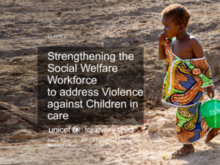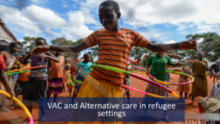This country page features an interactive, icon-based data dashboard providing a national-level overview of the status of children’s care and care reform efforts (a “Country Care Snapshot”), along with a list of resources and organizations in the country.
demographic_data
childrens_living_arrangement
children_living_without_bio
adoption
social_work_force
key_stakeholders
Key Stakeholders
Add New DataOther Relevant Reforms
Add New Datadrivers_of_institutionalisation
Drivers of Institutionaliziation
Add New Datakey_research_and_information
Key Data Sources
Add New DataReport on National Assessment of Centres caring for Children with Disabilities in Rwanda
National Integrated Child Rights Policy
Country Care Review: Rwanda
Prevalence and number of children living in institutional care: global, regional, and country estimates
The Way Forward Project Report
Community-Based Child Protection Mechanisms in Refugee Camps in Rwanda: An Ethnographic Study
Displaying 101 - 110 of 191
Rwanda recently lifted its ban on intercountry adoptions, causing concern over acting in the best interests of the child in any given case and whether proper monitoring mechanisms are in place to ensure the safety of adoptees.
Faith leaders in Rwanda are being urged to contribute to child protection efforts by engaging families to prevent violence and family separation.
Implementation of comprehensive care reform strategy in Rwanda has led to a successful transition from a system dependent on insitutionalization to one that embraces family-based care.
At convening of the Global First Ladies Alliance in New York, Rwanda's First Lady Jeannette Kagame shared the successes of Rwanda's care reform.
Inter-country adoption has been reinstated in Rwanda after government updated structures and mechanisms required under the Hague Convention.
Rwanda's National Commission for Children (NCC) is implementing the Integrated Child Rights Policy (ICRP), which will continue support for more coordinated and comprehensive services for children, including the national Child Care Reform program and addressing issues pertaining to children living and working on the street.
Over 3000 children from orphanages in Rwanda have been reintegrated into family-based care since 2012, reports an official from the National Children's Council.
This UNICEF presentation describes the need for social service workforce strengthening in East and Southern Africa and presents recommendations based on a case example from Rwanda.
This UNHCR presentation provides an overview of alternative care for children in East African refugee contexts.
The first week of June 2017 marked the conclusion of the three month 'Tubarerere Mu Muryango' (Let’s raise children in families) campaign in Rwanda. A joint effort led by Mashirika Performing Arts and Media Company, the campaign used theater, artwork and poetry to reach out to parents, caregivers and local authorities to promote support for Rwanda's recent efforts toward safe reintegration of children in orphanages/institutions into family based care in the country.


